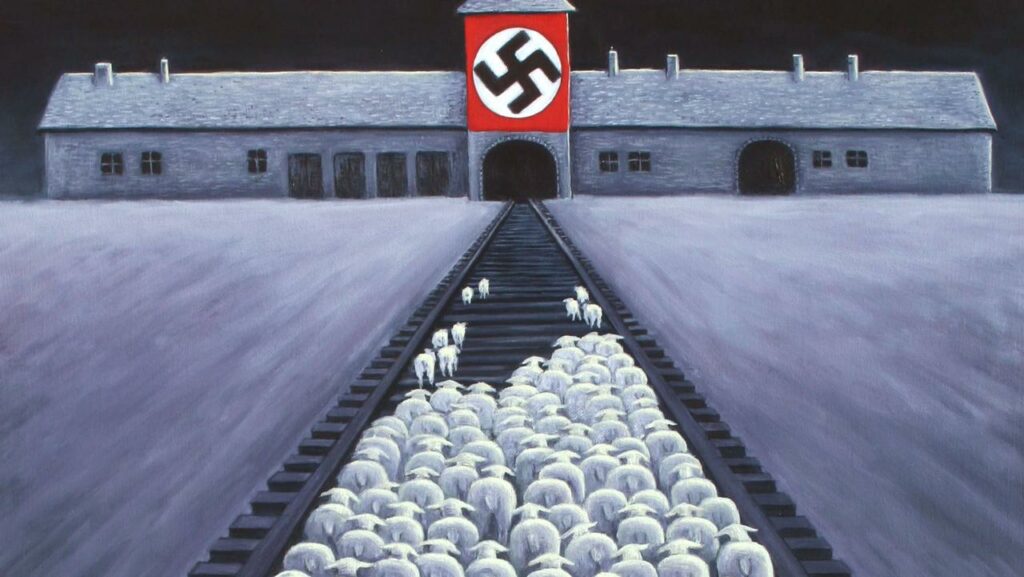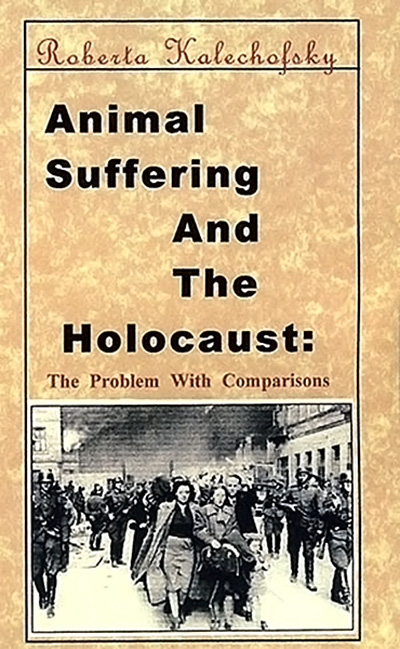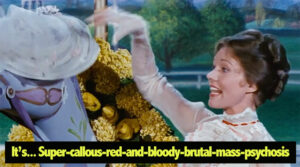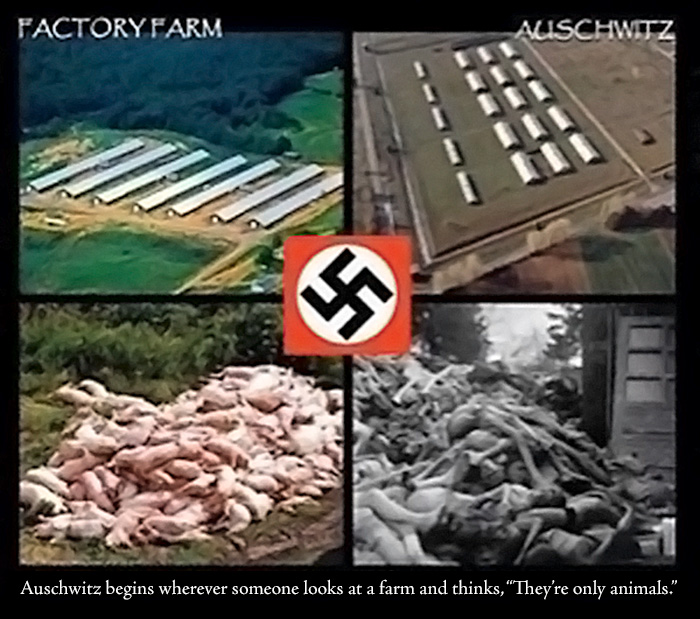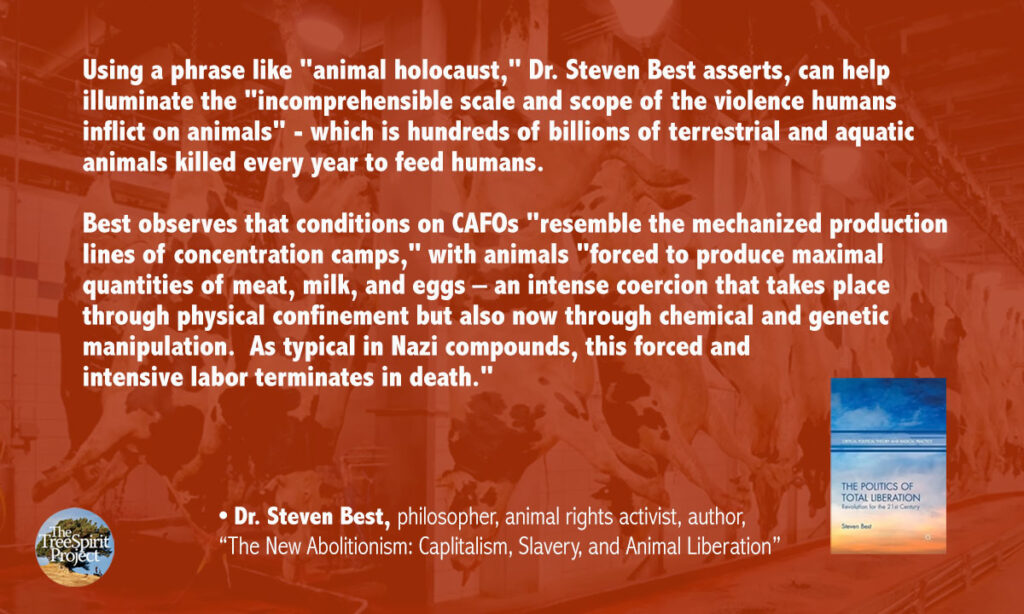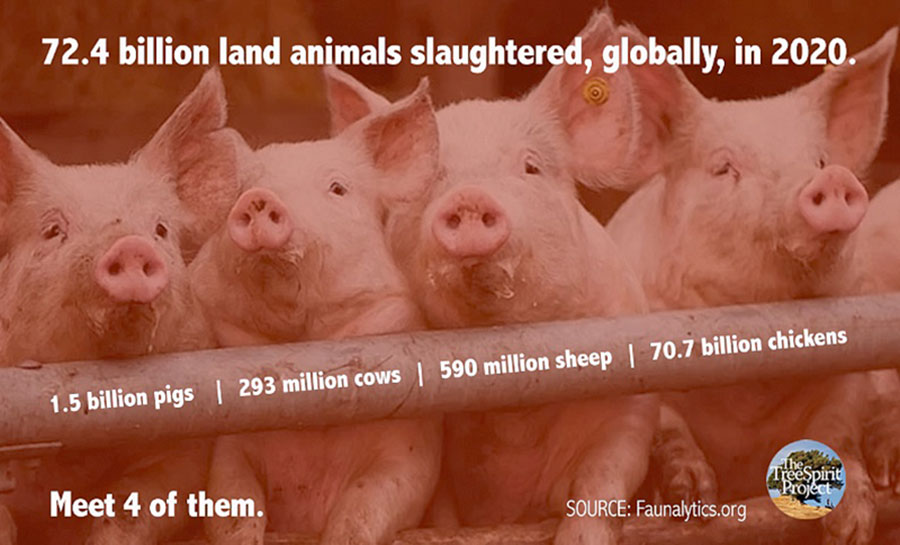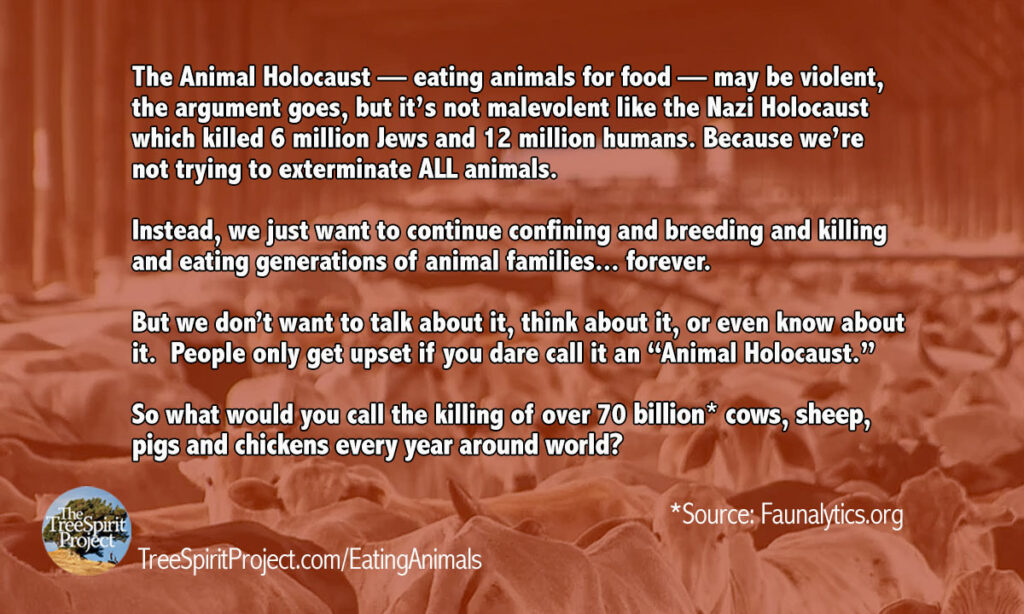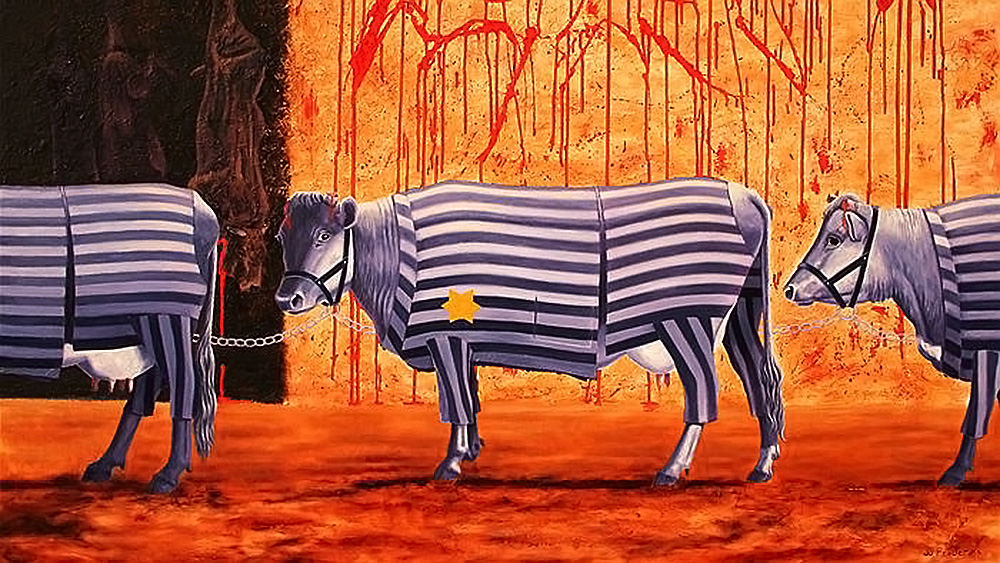I was offended by the comparison.
Until I thought a lot more about it.
Will you?
For years I winced whenever an animal rights activist used the word “holocaust” to describe the slaughter of animals for human consumption.
Even though I knew the scale of the animal-killing we humans do — many millions of (in particular) cows, pigs, chickens and sheep every year — was massive, the term “holocaust” comes with so much cultural baggage that the conversation about eating animals gets derailed into the traumatic cul de sac of Nazis, Jews, and WWW 2’s The Holocaust.
And other infamous human genocides, too: of native Americans, of Cambodians, of Africans and the slave trade, in East Timor, and on and historically, tragically on. You know, the typical, light, brunchtime topics discussed on the Mar-a-Lardo patio, after a round of golf, in Palm Beach, Florida.
We humans who live in civilizations can sure act uncivilized; we humans sure can act inhumanely. But mostly we don’t think of ourselves this way. We are, largely, creature of habit.
More recently though, I’ve listened to, read, and pondered why using the loaded “H” word isn’t, or is, appropriate to describe how we human animals treat non-human animals. And a funny thing happened on my way through the holocaust analogy: the animals-to-humans became more justifiable, not less so. How so? Read on.
As we wade into these treacherous rhetorical waters, I must note that I’m Jewish. This, for some, may mitigate some of the knee-jerk, “you’re anti-Semitic” reactions from non-Jews. But then some fellow Jews will exclaim, “That’s even worse; you should know better.” Or even, “You’re a Jewish anti-Semite!” Effectively deploying the ultimate Jew-on-Jew weapon: guilt.
I was recently told by a non-Jewish woman that I “shouldn’t bring up the Holocaust” when talking about humans killing over 70 billion land animals every year because the comparison may offend some people. And then they won’t hear what I have to say about the massive, systemic animals-to-slaughter march. And of course she’s not wrong. But then, being a particular flavor of Jewish, when I’m told I “shouldn’t” do or say something that I believe is both true and public debate is appropriate, well, as we patiently explain back in New York, New York, ‘Fuck that shit.’
Precisely because I grew up in a Jewish culture, in NYC, of which I’m both grateful and proud (and also grating and loud), I was taught to ask questions, welcome debate, and deploy humor in most if not all situations. Especially charged, contentious and difficult situations. So I’m less reluctant than non-New York non-Jews to visit this death camp of a conversation.
I was also given countless shots of filmic courage, as a teen and pre-teen, including by Mel Brooks’ original 1967 film, “The Producers,” which was outrageous in its day. And probably still today in some places, even though some of Mel’s art is dated compared to the degrees of outrageous permitted today. No one had ever before. on the pop culture, mass-market movie screen, dared anything like “Springtime for Hitler” — song & dance man Adolf and all those silly Nazis goosestepping on stage, to be laughed at/with. Because the real ones weren’t such cut-ups…
I consider myself culturally Jewish, but I’m not religious. As part of my cultural heritage, of which I’m also proud, I was taught that Jews are not just allowed, but encouraged to think for themselves; to question, challenge and discuss any and every topic. Even most rabbis, presumably guardians of the culture’s faith traditions, for example, welcome sincere questions and debate, on any topic. You can question the existence of God, the tenets of Judaism; any of it, all of it, anything and everything is fair game for inquiry. There is less tolerance for this pushback in some other religions, which will go unnamed here, fer Chrissakes. So although the Old Testament religions never appealed to me, this Jewish cherishing and encouragement of free and independent thought sure did. So don’t blame me for the discourse below; blame the Jews.
SPECIESISM – What’s worth more: an animal’s life or a human’s?
First, let’s touch on“speciesism,” one reason people think comparing the Jewish holocaust to what humans do to animals is unjustifiable, even inexcusable. Speciesism may be an unfamilar “ism” to you. (It’s relatively new to me.) An example: “How dare you compare a human life, Jewish or not, to a cow, pig or chicken’s life! You don’t really think an animal life is worth the same as a human life, do you?!”
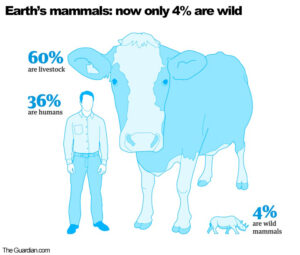 To which I reply: “I value all animal lives, both human animals and non-human animals. From Hindu to hippopotamus, from elephant to ant, from cow to cat, pig to Puritan, turkey to teen from Turkey, and back to Buddhist — and through every other religion — and back to human again. I advocate that we not torment and kill any animals, human or non-human, if we don’t have to in order to survive.
To which I reply: “I value all animal lives, both human animals and non-human animals. From Hindu to hippopotamus, from elephant to ant, from cow to cat, pig to Puritan, turkey to teen from Turkey, and back to Buddhist — and through every other religion — and back to human again. I advocate that we not torment and kill any animals, human or non-human, if we don’t have to in order to survive.
Our human ancestors needed to kill animals to live. We don’t; at least not most of us today. Pre-industrial humans lived more closely connected to the rest of natural world than the majority of us modern humans do today. Global industrialization and technological advances, for better and also for worse, means the majority of humans today live without having to hunt or forage for food ourselves. Especially because there are 8 billion of us now. And we’ve also already wiped out most the Earth’s wild animals. Today, only about 4% of the biomass (weight) of terrestrial mammals live in the wild, while about 60% of that terrestrial mammalian biomass is domesticated livestock — cows, pigs, sheep, goats, chickens, turkeys and so on.
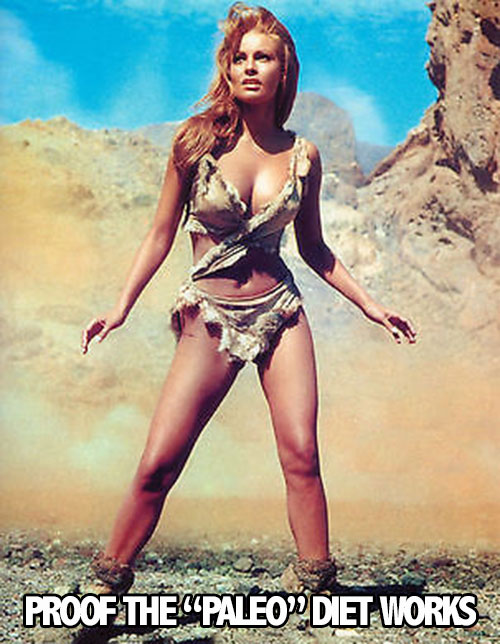 BUT WE ATE ANIMALS FOR THOUSANDS OF YEARS!
BUT WE ATE ANIMALS FOR THOUSANDS OF YEARS!
One of the reasons for the popularity of the so-called paleo diet, meaning that of paleolithic man, seems to be an (understandable) longing to return to a simpler time, one of greater connection to the natural world. The theory behind this dietic concept is that we should eat the simple, whole, unprocessed, hunter-gatherer diet, like early humans did. But the problem is we 20th century humans, one can reasonably argue, live, uh, somewhat differently than our hominid ancestors did from 2.5 million to 12,000 years ago.
About 70% of us Homo sapiens now live in giant, industrialized cities. We don’t expend massive amounts of energy hunting in the wild. And we have access to markets, and supermarkets and restaurants which put global produce and products right outside our caves – – I mean doors. (Althogh judging by Raquel’s photo above, bikinis haven’t evolved much since One Million Years, B.C.)
And here’s the thing: the vast majority of us humans no longer have to kill and eat animals to survive; we’re just in the habit of eating them. And we’ve become so thoroughly conditioned, over hundreds of generations, to eat animals, and love like the animal flesh tastes. Almost all of us are taught, from birth, to eat animals and consume the milk of other mammals, especially cow and goat mother’s milk. And the myriad, delicious-tasting dairy products, especially cheeses and butters and yogurts, which our industrialized societies produce in massive quantities to feed the massive human population.
• But today, for most humans, dairy products are no longer necessary.
• And humans are the only species which drinks huge quantities of the mother’s milk of another species.
• And only humans drink other-mother-species milk beyond infancy, into adulthood, and to the grave. WTF?
WHY DO WE EAT SO MUCH BEEF & DAIRY?
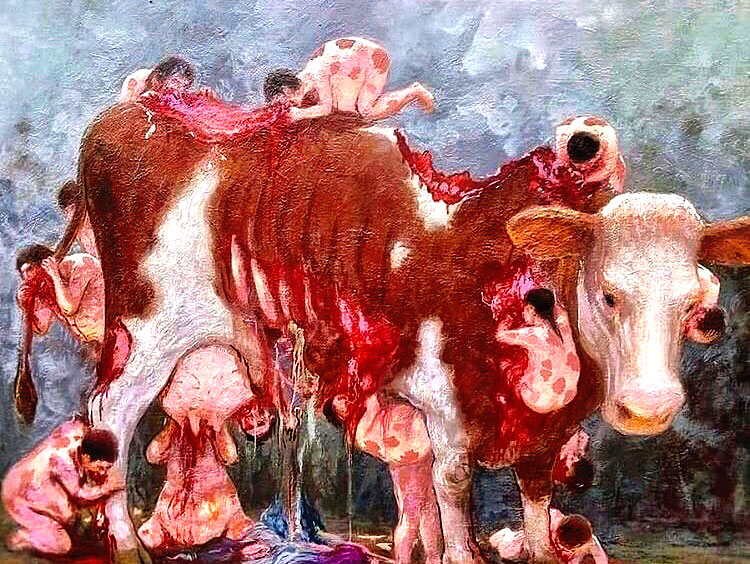
One big reason is the meat and milk industry advertising is endlessly pounding away at our conscious and unconscious minds. For profit. To hoodwink us into believing myths and outright lies. This is so pervasive, so normalized, that we’re not really aware of it. One commonly believed and absurd example is that we can all eat meat and milk from small, local farms. You probably believe this. Support your local farmer, right? (Which, btw, I agree with; right on, local farm workers!) But the math, simple geography — and a quick common sense check — don’t support this popular industry public relations myth we’ve all swallowed. It’s a myth, it’s false, because we humans are too numerous for us all to produce all of our own animal-based foods locally now, especially in our swollen urban centers (where, to repeat, about 70% of humanity now lives).
And if you wanna argue this point, note I said animal products, not vegetable products. So before you go all Kiss The Ground on me, yes, I wholeheartedly support backyard and small and local vegetable production, and increasingly work to de-corporatize and decentralize profit-driven (and junk) food production. And organic vegetable crops without synthetic chemicals which produce over 95% of our produce today. And yeah, too, for community vegetable gardens. And urban rooftop gardens, and all the rest. Yes, “know your farmer,” as the saying and T-shirt go.
But don’t think that small, local farmers can feed the majority of humans, let alone feed all Americans, the huge numbers of cows, cow’s milk products, pigs and sheep in the quantities we currently are in the habit of consuming, which is typically 3x day. And certainly not “sustainably,” to use that buzzword that actually has no USDA certification or legal meaning. Meaning reading “sustainably raised” on a 1 lb. package of “beef” — aka, cow, actually and legally has no meaning whatsover.
SUPPORT YOUR LOCAL PLANT FARMER
To say it again: raising the necessary millions of cows and pigs and goats and sheep and chickens to feed us in the huge quantities we eat is no longer possible without mass production. And thus mass, industrialized extermination. Which brings us back to Doe-hey-me-fah-so-long-kill-deer — and the Holocaust comparison. Because we can’t produce cow and pig and chicken products in sufficient numbers to feed today’s 340 million “meat”-addicted Americans, let alone Europe’s, China’s, India’s and all world’s 8 billion humans.
But this even the local production impossibility ignores the ethical issues of eating animals. And even the term “ethical issues” falls colossally short of communicating the reality of the brutality of what we’re doing – – but the term “Animal Holocaust” more accurately does. Hence its use by animal rights activists, to get people to react — and think, and really re-think, what we’ve all been taught to do unconsciously, without examination.
In fact, thanks to videos of animal rights activist Gary Yourofsky (who is also Jewish) speaking about the “Animal Holocaust,” I now say this about the concentration camp-animals slaughterhouse comparison: “You’re right; I shouldn’t compare what we do to animals to the Nazi Holocaust of Jews… because what we do to animals is arguably even worse — meaning on an unimaginably larger scale. And in secret.
And if that makes you think, “WTF is wrong with you, Jack,?” I get it. But don’t quit on me now; read on.
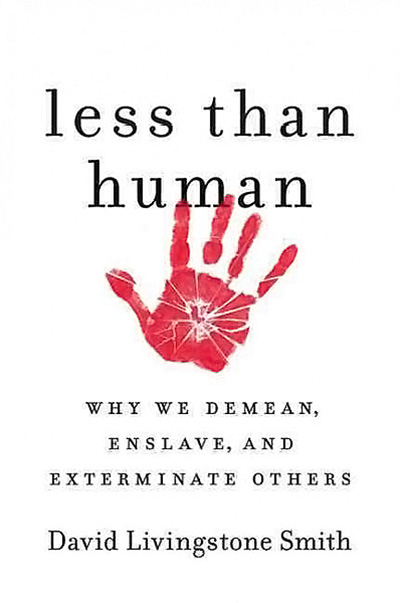 Thousands of innocent, defenseless animals are violently killed in slaughterhouses in the time it takes you read this single sentence. And, to repeat, they’re not dying for any human survival necessity; we have many other non-animal foods to eat. In our modern societies, we’re killing millions of animals, every day, out of habit and tradition. And ths tradition is supercharged by the profit motive.
Thousands of innocent, defenseless animals are violently killed in slaughterhouses in the time it takes you read this single sentence. And, to repeat, they’re not dying for any human survival necessity; we have many other non-animal foods to eat. In our modern societies, we’re killing millions of animals, every day, out of habit and tradition. And ths tradition is supercharged by the profit motive.
1st and foremost, we imprison, torture and kill animals in exponentially greater numbers than the 6 million Jews and 12 million humans Germany exterminated in WW2. (Some supporting statistics about animal slaughter to follow.)
2nd, the Animal Holocaust is not a dark, disturbing chapter of our past, in the long history of brutal human atrocities. The Animal Holocaust is ongoing. Today. Now. As you read this essay.
IT’S SO AWFUL; I WON’T EVEN THINK ABOUT IT!
3rd, we steadfastly refuse to even acknowledge, collectively, that a mass, industrialized slaughter of animals is being perpetrated. Perpetually. Always, ongoing, endlessly. Our societies, including American society, refuse to acknowledge the scale of this constant, mass killing. We live in a haze of denial about the brutality of it.
The proof of how horrific it is, is this, our complete denial of its existence. We all willingly, semi-consciously hides the truth of it. Even though we all know about it. This is a mass self-delusion we all partake in, with staggeringly few exceptions. Hiding the scale of the global animal-killing by our species is truth is the giveaway that the truth is awful. Even Nazis knew to hide the truth of their death camps from the world at large, lest the world take action against the horror. (And yes, I know that some Americans did know, and some American industrialists knew, but the majority of the citizenry did not.)
“Nowhere to Run” — documentary short film interviews slaughterhouse workers
4th factor: massive, multi-billion dollar, industry-driven public relations, advertising, and marketing campaigns hide the brutal truth of animal slaughter. Instead, we are sold an appetizing illusion we eagerly consume. We have the choice between a blood-soaked red pill, and a pie-in-the-sky blue pill. Who wouldn’t eat the illusion — especially since you’re served it from infancy.
“Humane slaughter” is only one of the more current, effective, industry-driven, public relations euphemisms (aka, lies) consumers eat along with their lamb chops. (What is a “chop” anyway? Answer: just another euphemism, for the leg of a slaughtered lamb, among the avalanche of lies and misdirections we use to trowel over the bloody truth.)
5th, the Nazis modeled their concentration camps and gas chambers on… animal slaughterhouses. Including those in Chicago, USA. J. M. Coetzee, a South African–Australian writer and 2003 Nobel Prize laureate in Literature, said of the Nazis’ treatment of Jews:
“… in the 20th century, a group of powerful and bloody-minded men in Germany hit on the idea of adapting the methods of the industrial stockyard, as pioneered and perfected in Chicago, to the slaughter – or what they preferred to call the processing – of human beings.” READ MORE on this topic HERE.
And we’re also all now very much addicted; we love our bacon, our burgers, our deep dish (extra) cheese pizzas. In the United States in particular, we live for, and slaughter for (and also die from) mere palate pleasure. “Sorry to kill you, Porky the Pig — who is as emotional as my pet dog and even more intelligent — but I just love the way you taste as my morning ‘bacon’.” To concoct a quote from the non-existent film classic, Apocalypse Cow, “I love the smell of bacon in the morning. It smells like… family.”
By the way, if this whole topic is uncomfortable or repellent to you, I ask you to probe into why it is before you quit on me here. Because you’re very likely in the majority of humans who eat animal products — thus actively perpetuating their needless deaths.
DON’T WORRY, YOU’RE NOT ALONE
If you eat “meat” (animals), you’re not alone. You’re in the majority. Pretty much all humans are responsible, collectively, for a massive, mechanized, industrialized animal slaughtering system. And because the reality of this killing system is so morally disturbing, we hide the entire apparatus — including from ourselves. It’s another reason the use of the sensational descriptive, “holocaust,” is justified. It’s what the Nazis did too, hiding the reality of mass extermination “camps” from the public. Even Nazis, not the kindest of folk, knew there would be outrage if the horrific truth of mass slaughter were revealed to the world.
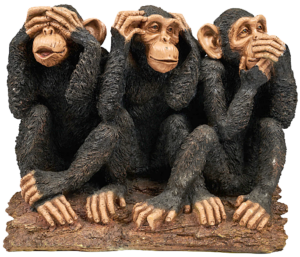
See no slaughter, Hear no slaughter…
About 98% of humanity is not (yet) vegan; “pre-vegan,” as animal rights activist Will Tuttle optimistically puts it, in promoting his aptly-named, “World Peace Diet.” This is how normalized the Animal Holocaust is. Even vegetarians — people who “don’t eat meat but do eat ‘only’ eggs and milk and cheese and ice cream” — are in the majority still stuck in the cultural conditioning of denial.
Even vegetarians don’t want to acknowledge the connections between the animal products they eat — especially dairy products like milk, cheese and yogurt — and the tremendous suffering forced upon animals to make them.
Vegetarians, who care more than most humans about animal welfare, also support animal suffering which their grocery purchases perpetuate. Rampant, ongoing, daily and systemic animal confinement, sexual abuse (e.g., forcible impregnation), abuse (confinement in small, indoor spaces) and killing. That’s how powerful the conditioning is. So billions of humans will not-see. (Rhymes with Yahtzee, rhymes with Nazi!)
Like everyone around me, for over 50 years, I ate copioius, daily amounts of “meat” (cows, pigs, sheeps, chickens, turkeys) and milk and cheese and butter and ice cream, so I’m not calling anyone out — I’m calling ALL of us out. Humanity is mind-bogglingly, heart-crushingly, not humane to the non-human animals we share this planet with.
Yet even with all this carnage, the term Animal Holocaust still sparks outrage. One fellow Jewish writer, Ariel Sobel, published an article, from which I titled this essay, “Dear Vegans, Stop Comparing Animal Slaughter to the Holocaust.” (Ms. Sobel’s full Oct. 3, 2018 article is HERE) She expresses her disgust with the Jews-animals comparison this way:
“...I noticed a pro-vegan graphic [BELOW – JG] that made me want to upchuck my turkey sandwich. It was a stack of bodies in Auschwitz piled up, shown side by side with a heap of hunted pigs. With a swastika in the center, the image compares the atrocities committed by the Nazis to factory farming. I wish I could say that this was a rogue image, but in reality, it’s a deeply anti-Semitic brand of vegan propaganda which refers to the slaughter of livestock as the “animal Holocaust.”
Ms. Sobel continues: “…vegans left and right truly believe that eating meat is just as traumatic of an atrocity as the near-successful attempt to mass-exterminate Jewish people.“
And I completely agree with her viewpoint — IF you only view humanity’s habit of eating billions of animals each year only from humanity’s point of view. “Well, what the hell other viewpoint is there?,” you ask?
WHICH BRINGS US BACK TO “SPECIESISM”
Speciesism is the common, deeply ingrained, human-centric perspective about a human-centric perspective: that humans have more intrinsic value than animals. We’re all conditioned to believe this growing up. Which makes sense in that it’s convenient for us humans to believe, thus justifying using animals for anything, and everything from food to clothing to entertainment to sport. It then becomes an unconscious belief that trains us to ignore the deadly effect we humans have on billions of animals every year, every day, every second in this moral — or immoral — equation. The number of animals we humans kill is so large is it literally impossible to picture or imagine.
Ms. Sobel, as do many others, rails against comparing the Nazi attempt to exterminate an entire culture and religion of humans (Jews are not a race of people) with the slaughtering of animals for food. The Nazi Holocaust is not just horrific, this argument goes, but also malevolent, intending to wipe an entire culture and religion off the face of the Earth.
The Animal Holocaust may be violent, but not malevolent, this argument goes; we don’t want to exterminate all the animals we eat because we want to keep raising them and killing them and eating them — forever. But this just makes the Animal Holocaust an ongoing, never-ending one, which is worse than the Jewish Holocaust in a different way.
But this distinction — we don’t want to wipe out all you cows, pigs, sheep, chickens and turkeys; we want to continue killing you all, systemically, automatedly if possible, forever. — This is a meaningless distinction to each individual animal, just one of billions who will be killed this year to be eaten by humans.
So again, whose point of view should we consider all this? The warm-hearted philosopher — and children’s book author — Shel Silverstein addressed this issue as well as anyone:
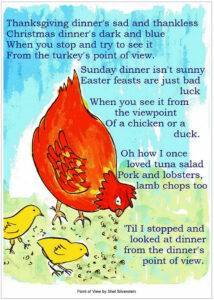 Point of View – by Shel Silverstein
Point of View – by Shel Silverstein
Thanksgiving dinner’s sad and thankless
Christmas dinner’s dark and blue
When you stop and try to see it
From the dinner’s point of view.
Sunday dinner isn’t sunny
Easter feasts are just bad luck
When you see it from the view point
of a chicken or a duck.
Oh how I once loved tuna salad,
Pork, lobsters, lamb chops too
‘Til I stopped and looked at dinner
From the dinner’s point of view.
Another fun fact: the Animal Holocaust will also, indirectly, kill more humans than the Jewish Holocaust did. Huh, what? Because of our necessarily massive scale of animals-as-food production, to feed billions of humans. Particularly our cutting down 1-2 acres of Amazon rainforest every second of every day of every week of every month of every year to graze millions of cows for their “meat” and milk — which is a main driver of global deforestation. Greenhouse gas emissions, especially the methane produced by cows, greater than the impact of natural gas fracking if you take into account the loss of forest carbon sequestration. The resultant contribution to global heating, aka the climate crisis means raising cows for “beef” and cow’s milk for human consumption poses an existential threat to all of humanity, Jews and non-Jews alike. READ MORE.
One last outraged complaint by Ms.Sobel in her ‘don’t say Holocaust’ article:
Dear vegans shouting “animal Holocaust”: You are not empowering animals. In fact, you’re falling prey to Hitler ideology — that Jewish people are subhuman. The Nazis believed my grandparents were as savage as beasts. They used propaganda to compare us to rodents and other fauna. This was a means of numbing society’s hearts to us, to tolerate and even get people to carry out our mass murder. Now you’re doing the same. [Bolding added – JG]
She continues: There’s no doubt that the victims of concentration camps were treated like animals. The “animal Holocaust” imagery is, in many ways, spot on. That was the goal of the Nazis: to rip an entire ethnicity of its humanity. Why propagate the imagery that promotes that narrative?
Again, I agree with her. Each and every point she makes is valid. Yet the trouble is, that was then and there in WWII Nazi Germany, and this is here and now in industrialized 2024. And I, along with many of my fellow vegan activists (and in my case as an environmental activists too), have logically, scientifically irrefutable reasoning for the necessity of humanity ending our historic practice of eating animals.
WE HUMANS SHOULD STOP TREATING ANIMALS LIKE ANIMALS
In addition, we humans should and must cease treating animals “like animals.” For ethical reasons. For environmental reasons too. And for health reasons three. Many animal rights activists focus on only the first reason. Fine. But I, ever the strategist, use all three reasons, since all three are true and, different people respond to different lines of reasoning. If you love cats or dogs, how can you justify needlessly slaughtering pigs, which are like pigpen puppies, and cows, which are like big, gentle pasture puppies? Even if you focus only on the environment, eating cows and cheese and drinking meat is a direct contradiction of your proclaimed care for planetary health.
We human animals can and should treat non-human animals as equals, with an equal right to life. And an equal right to live without being abused, exploited, commodified, and of course killed because none of the killing is done in self-defense. Even from an anthropocentric view, eating animals harms humanity, and the ecosystems which sustain us. Eating animals si an unnecessary, cataclysmic, self-inflicted holocaust on ourselves.
This isn’t just revolutionary thought, it’s evolutionary thought. We no longer need to kill animals to survive. Continuing to do so on the mass, industrialized scale we do, in order to feed 8,000,000,000 humans — which is a colossal Animal Holocaust — is both ecocidal and suicidal. Feeding animals huge amounts of plants food so we can then eat them is a wildly inefficient and planet-polluting way to feed ourselves. (Despite what rancher John Dutton of Yellowstone wants you to believe.) READ ALL ABOUT IT.
I choose a different, non-anthropocentric, vantage point. Because if we intelligent humans, also capable of great compassion and empathy, and are willing to look at our treatment of animals from the animal’s point of view, everything, everywhere, changes all at once.
I hope we all agree that animals are innocent of any crimes or behavior justifying their execution. I’d hope we can also agree that each and every non-human animal is a unique individual who feels pain and suffers in much the same way we humans do. Or at least very similarly to how our pet dogs, cats and horses do. Let’s start there.
We have enacted laws to prevent cruel and abusive treatment of these animals we keep in our homes. Anyone who wants to argue that animals don’t suffer like we do is simply, even understandbly denying an obvious truth in order to not have to change old, ingrained behaviors. And also hasn’t watched either of two powerful documentary films, “Dominion” or “Earthlings.” Watch one tonight, and call me in the morning.
“Animals don’t feel pain the way we do” is a commonplace, and lazy argument; so obviously false as to be a basic evasion tactic. Both documentary films conveys just some of the visceral horror of what the needless suffering we human animals wreak upon non-human animals. We abuse, torment and kill them because of humanity’s culturally-ingrained “speciesism” bias. Both movies quickly turn the “animals don’t feel pain” claim to the trash bin where it belongs.
BUT WAIT, THERE ARE MORE JEWS SAYING IT’S AN ‘ANIMAL HOLOCAUST’
So, digging a bit more into this topic reveals more Jewish vegan and animal rights activists making the comparison, unafraid to use the term Animal Holocaust.
Dr. Alex Hershaft, himself a Nazi Holocaust survivor as a child, came to this conclusion on his own, years ago. Dr. Hershaft went on to found the advocacy organization Farm Animal Rights Movement (FARM) in Bethesda Maryland. WATCH VIDEO INTERVIEW:
Arno Klarsfeld’s father, Serge Klarsfeld was a French Holocaust survivor, and a well-known Nazi hunter.
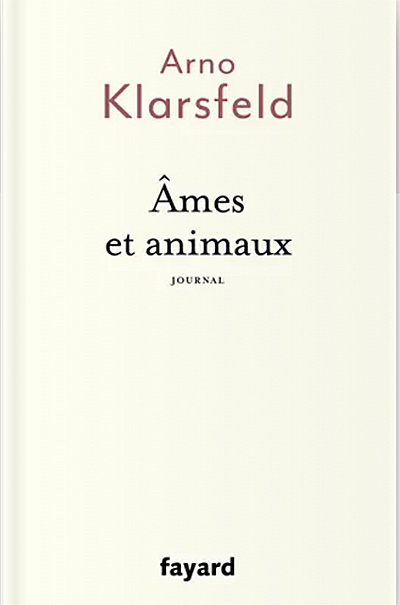 Arno became a lawyer, animal rights activist, and wrote the book, “Souls and Animals.” In it he asserts:
Arno became a lawyer, animal rights activist, and wrote the book, “Souls and Animals.” In it he asserts:
“For animals in the meat industry, there’s no God, like there was no God for the Jewish families mercilessly murdered in the Holocaust. Singer was right: For some animals, life is an eternal Treblinka.”
But Klarsfeld borrowed that thought from Polish-American author Isaac Bashevis Singer, 1978 Nobel Prize winner in Literature, who made the Holocaust comparison in several of his stories. In his 1968 The Letter Writer, the protagonist says, “In relation to [animals], all people are Nazis; for the animals, it is an eternal Treblinka.”
For billions of animals, humans are Nazis and life is an eternal Treblinka.
And in Isaac Bashevis Singer’s The Penitent, the protagonist says “when it comes to animals, every man is a Nazi”.
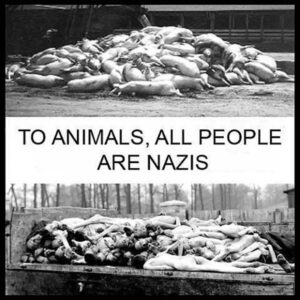 Two more authors make no apologies for the direct Holocaust comparison. The following two paragraphs from a Wikipedia page on this topic. (With apologies to my historian cousin who chastises me for using Wiki as a reliable source for any information. Color me layman.)
Two more authors make no apologies for the direct Holocaust comparison. The following two paragraphs from a Wikipedia page on this topic. (With apologies to my historian cousin who chastises me for using Wiki as a reliable source for any information. Color me layman.)
Perhaps the earliest use of the animal-human holocaust analogy comes from Edgar Kupfer-Koberwitz, a German concentration camp survivor and journalist, who wrote in 1940 in his “Dachau Diaries” from inside the Dachau Concentration Camp that “I have suffered so much myself that I can feel other creatures’ suffering by virtue of my own.”
And, “I believe as long as man tortures and kills animals, he will torture and kill humans as well—and wars will be waged—for killing must be practiced and learned on a small scale.”
Another Holocaust survivor who has written on the subject is Alex Hershaft, now a vegan activist, who also compared the treatment of livestock to the Holocaust. He said, “We’re focusing on the victims rather than the cancer of oppression itself.”
And, “I noted with horror the striking similarities between what the Nazis did to my family and my people, and what we do to animals we raise for food: the branding or tattooing of serial numbers to identify victims, the use of cattle cars to transport victims to their death, the crowded housing of victims in wood crates, the arbitrary designation of who lives and who dies — the Christian lives, the Jew dies; the dog lives, the pig dies.”
We are taught about the web of interconnected, interdependent life on Earth in grade school. But are all taught to ignore this reality when it comes to the animals we eat. Cultural conditioning blinds us to the treatment of the animals we don’t consider “pets.” Conditioning enables us to kill billions of animals every year — trillions, really, if you count fish in the ocean — and not even acknowledge that we’re doing it.
By our habit of eating animals, we are destroying planetary ecosystems that sustain all life on Earth, including our own. Is it really a stretch to refer to this much killing and carnage, on a global scale, as a “holocaust?”
The Animal Holocaust we are all perpetrating is on a scale mind-bogglingly larger than the Nazi Holocaust. 6,000,000 Jews, and an estimated 12,000,000 people overall (including blacks, Catholics, the disabled, and so on) is the huge number of victims who were murdered by the Nazis.
Compare that monstrous, historical body count to this number: over 70 billion land animals – mostly cows, pigs, chickens and sheep — whom we humans slaughter, and eat, every single year. (I’m even setting aside the additional trillions of sea creatures we call ‘fish’, although I’m not sure why.)
That’s over 190 million land animals every single day.
And for people who trot out the argument, “Hey, we humans need to eat,” they won’t like the rebuttal. Because it’s true: “Instead of eating animals, which the vast majority of us no longer need to, we should just eat the plethora of readily available and inexpensive plant foods, rather than push plants through animals so we can then eat the animals. Just remove the middlmanpigcow. We’d then need to grow only about 1/10th the amount of vegetables that we do (to feed animals), and on about 1/10th the land we currently deforest and degrade to feed cattle for human consumption.
We could then re-wild hundreds of millions of acres of cattle (and sheep) pasture land currently given over to the methane-emitting ruminants. Killing and eating cows, despite its deep roots in American cowboy romanticism, is one of the most inefficient ways imaginable to feed humans. This would also mean we’d finally stop cutting down so much of Earth’s precious rainforests, which is primarily done to graze cattle and grow the (GMO) corn and soy crops we feed them. READ MORE if you don’t believe this.
And if you’ve bought into the beef and dairy industry’s newest public relations, uh, bullshit, so-called “regenerative ranching,” READ THIS WEBPAGE debunking it. Because it’s just the latest ploy to justify continuing massive deforestation, GHGs emission, land degradation, and of course the Animal Holocaust.
![]()
More likely than not, you’re normal; typical. Meaning, just like me and most other humans, you were raised in a society that brutalizes and kills animals, but hides it away (especially in the United States). And conditions us all to never talk about it, nor even think about the reality of this brutal system.
And if someone does want to even just talk about it, we reflexively push it away, and push them away as the weird ones… “Oh, those annoying vegans.” If you’ve read this far, you’re already outside the norm. Even as the daily Animal Holocaust continues.
So yes, comparing the Nazi Holocaust of the 20th century to the Animal Holocaust of the 21st century is a mistake — because the Animal Holocaust is much bigger, more extensive. And ongoing. And we won’t even talk about it, or dare to call it a holocaust. Just like the Nazis knew to hide their death camps from the public, because of the inevitable outrage.
But when we dare to use the word holocaust to describe our treatment of animals today, which makes most people feel uncomfortable, because they then have to think about it, then they, you, we, might begin to see the colossal scale of animal-killing and animal-eating for what it actually is.
I know this makes people feel uncomfortable. I too, got away from the people who “push their unpleasant views” on me. Or challenge my strong beliefs and lifelong habits. But today I know how much more uncomfortable it is for the cow, the pig, the sheep, and the chicken who suffer more than we ever will.
We also pay a psychic price, both individually and collectively for avoiding the truth we sort of know, intellectually, but don’t want to face emotionally, viscerally. Hence the emotional discomfort, the cognitive dissonance, around this topic, and the phrase Animal Holocaust.
If you eat animal products — including cheese, butter, yogurt, ice cream and other dairy products, you are the equivalent of the German citizen during the Second World War who doesn’t want to know what’s behind those rumors of concentration camps and gas chambers because, hey, the economy is humming and the country is strong again.
And if you think that’s harsh, watch just 15 minutes of either documentary movie, “Dominion” or “Earthlings,” and then get back to me with your reasoned rebuttal. I’m all ears.
2-min. VIDEO: “Dominion” documentary film trailer:
READ MORE:
• Wikipedia’s “Holocaust analogy in animal rights” page
• TreeSpirit’s Eating Animals page: http://www.TreeSpiritProject.com/EatingAnimals
• TreeSpirit’s Go Vegan help page: http://www.TreeSpiritProject.com/vegan

